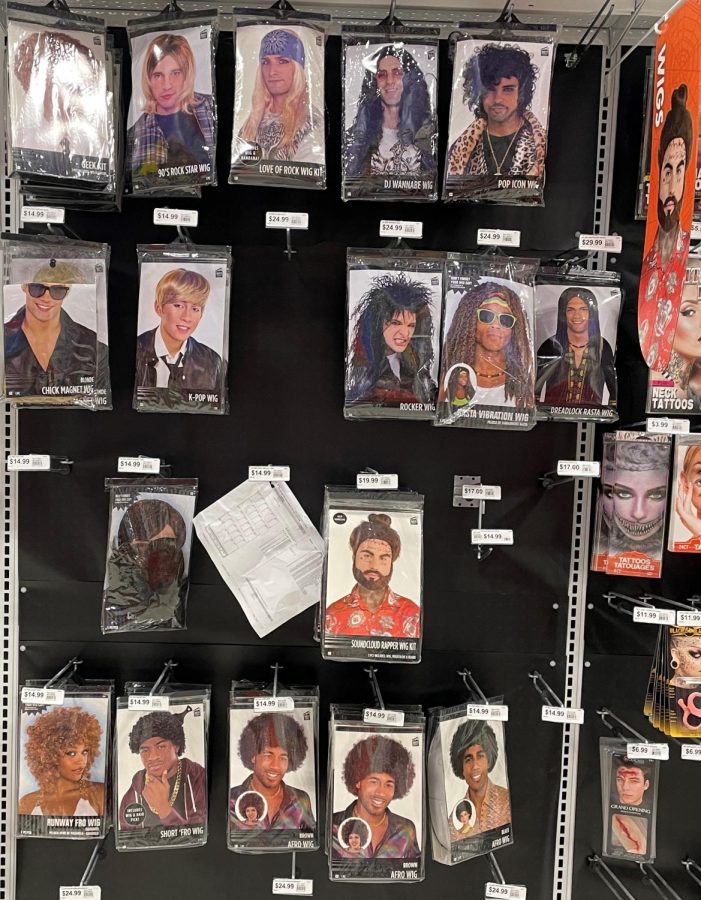Halloween costumes: cultural appreciation or cultural appropriation?
Photo courtesy of Robbie Kugler
A selection of wigs for sale at Party City. Two of the wigs for sale, titled the “Rasta Vibration Wig” and the “Dreadlock Rasta Wig,” respectively, seem to appropriate Rastafari culture. There are also several wigs available that attempt to replicate elements of African American culture, including the “Black Afro Wig,” “Brown Afro Wig,” “Short ‘Fro Wig,” and “Runway Fro Wig.” Each one of these wigs appears to play into some sort of racial or cultural stereotype, and many of the other products for sale at Party City also play into stereotypes. Although, to their credit, Party City does not appear to carry costumes based on the Indigenous Peoples of America anymore, so that’s something.
October 28, 2021
As the Halloween season kicks into full gear, students share their thoughts on the ethics of a person wearing a costume based on a culture they are not a part of, as well as some of their own personal experiences with the topic.
People across the United States choose to celebrate Halloween by dressing up with the clothing of niche or marginalized groups. This could mean wearing religiously significant clothes out of context or trying to adopt the traditional clothing style of a minority race, such as the Indigenous Peoples of America or the Pacific Islanders. In many respects, this practice could be likened to cultural fetishizing, although the difference between appropriating another culture and simply appreciating it can be a very slippery slope.
“All of the costumes are so stereotypical,” said freshman Ashley Virts. “Like, if you go into Party City and you look at the costumes, it’s all so stereotypical. So, because of that, you’d just kind of be stereotyping that culture. And you’re taking something from a culture and trying to make it into like, some [sort of] entertainment, when it’s someone’s culture.”
“[It’s] pretty negative, especially if [they’re] mocking [the culture],” said sophomore Josie Smith. “[I] haven’t seen it in real life, [but I’ve] seen it in videos.”
“[I’ve] seen [it] on social [media],” said sophomore Meghana Prathipati.
“[It’s] alright if [they’re] trying to embrace it,” said sophomore Madison Abichet. “Not if [they’re] mocking [the culture].”
“[It] depends on the situation,” said freshman Nathan Jung. “Stereotypes [are] bad. [If it’s] not alienating, in theory, it’s okay.”
“[It’s] okay, as long as you’re respectful,” said sophomore Isabella Alonzo.
“They may not mean to disrespect, but it still is [disrespectful],” said freshman Abby Stein.
“If you know about [the culture] and [are a] part of it, then yes, [it’s okay],” said sophomore Rachel Woodworth. “No if you don’t.”
“[It’s] fine, as long as you’re aware, as long as you don’t make rude comments,” said sophomore Sophia Don. “Before [COVID-19, my friends] went as Native [American] themed. Wasn’t much, [just] tan colored clothing, beaded necklaces.”
“[I’ve] seen people dressed as natives,” said sophomore Lizzie Collins.
“I think it could come across as racist,” said freshman Marina Mancuso. “I think it really depends, but you should definitely be careful about what you do.”
“Sometimes [it] can be offensive, if you do it wrong,” said sophomore Rylee Kelleher. “It’s not, like, funny or anything like that. Don’t change the color of your skin.”
“Blackface isn’t okay,” said sophomore Katie James.
“[It] shouldn’t be done, and a lot of the time [the costumes] are sexualized,” said freshman Sarah Macdonald. “Best to be avoided.”
“Not dressing slutty,” said Collins. “That’s okay.”
“I’ve mostly seen kids dressing up,” said James. “Sexualizing kids [isn’t okay].”
“If [you’re] doing [it] maliciously, it’s not okay,” said sophomore Samantha Walker. “[It’s] okay if little kids are just drawing inspiration.”
“[It] depends on [the] situation, [if they’ve] been encouraged by people from said culture,” said senior Kathryn Jameson.
“I don’t care,” said freshman Will Lombardo. “I mean, I don’t do it, so yeah.”
“I don’t even celebrate Halloween,” said freshman Dylan Pierrelouis.





